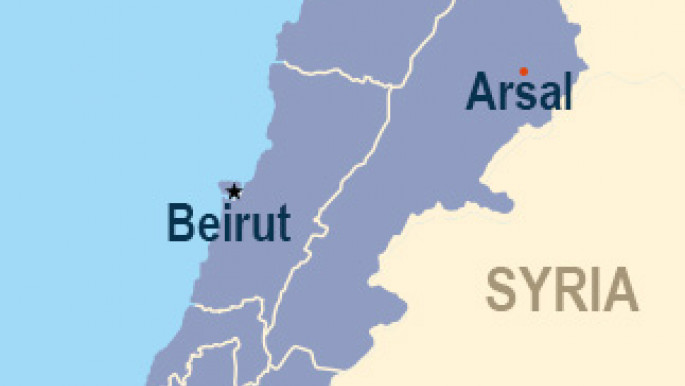'Syrian airstrikes' launch panic in Lebanese border town
Analysis: Arsal in Lebanon is again in the news after what witnesses said were Syrian airstrikes in its mountainous areas, stoking fears of an imminent military operation.
2 min read
Lebanese serviceman George al-Khoury was one of 16 released by al-Nusra Front [AFP]
The Syrian regime has reportedly launched air raids on the outskirts of Arsal in Lebanon - a week after the Lebanese state and al-Qaeda affiliate al-Nusra Front exchanged prisoners amid the border town's barren mountains.
Several successive explosions were heard on the outskirts of Arsal on Monday morning, when military aircraft - said to belong to the Syrian regime - launched airstrikes on the Wadi Zaarour area, according to witnesses.
Wadi Zaarour is an area which includes several stone quarries and agricultural land.
Locals told al-Araby al-Jadeed that quarry workers "miraculously escaped the Syrian raids" and left the area after the bombing.
State media in Damascus has yet to report the alleged raid, and it remains unclear whether the aircraft involved were, in fact, Syrian - or whether they were from any of the other military forces involved in the war in the skies over Syria.
The Lebanese Army is positioned nearly 1.5 kilometres from the bombsite, and troops are equipped with anti-aircraft weapons, according to witnesses.
Rumours circulated among Arsal's residents about an imminent military operation in the town's barren mountains, or that the town would again be besieged.
The terms of the already implemented prisoners' exchange deal included Lebanon securing a humanitarian corridor for Arsal's residents from the town to its mountainous areas.
The mountains neighbouring Arsal have become intertwined with Syrian territories under the control of armed groups.
"Arsal on the eastern borders with Syria is an occupied area," said Lebanon's interior minister, Nohad Machnouk, last week.
He said what was happening there was linked to the Syrian crisis, and the town "has 120,000 Syrian refugees, or more than the number of its population" living there.
"Thousands of armed militants are present in [its] barren mountainous areas," said Machnouk.
The deputy head of Hizballah's Executive Council Nabil Qaouq said on Sunday that his party would "not tolerate the presence of any takfiri [Sunnis who accuse other Muslims of apostasy] bastions on either side of the Lebanese-Syrian border," in reference to Islamic militant groups such as al-Nusra Front and the Islamic State group.
"The deal that freed the servicemen does not at all mean that the score has been settled with the terrorist killers," Qaouq added.
Last week's deal saw 16 Lebanese army and police personnel being set free by al-Nusra in exchange for the release of more than two dozen inmates from Lebanese and Syrian prisons.
While the deal puts an end to the plight of kidnapped Lebanese servicemen held by Nusra, other soldiers continue to be held hostage by IS for more than a year.
Several successive explosions were heard on the outskirts of Arsal on Monday morning, when military aircraft - said to belong to the Syrian regime - launched airstrikes on the Wadi Zaarour area, according to witnesses.
Wadi Zaarour is an area which includes several stone quarries and agricultural land.
Locals told al-Araby al-Jadeed that quarry workers "miraculously escaped the Syrian raids" and left the area after the bombing.
State media in Damascus has yet to report the alleged raid, and it remains unclear whether the aircraft involved were, in fact, Syrian - or whether they were from any of the other military forces involved in the war in the skies over Syria.
The Lebanese Army is positioned nearly 1.5 kilometres from the bombsite, and troops are equipped with anti-aircraft weapons, according to witnesses.
Rumours circulated among Arsal's residents about an imminent military operation in the town's barren mountains, or that the town would again be besieged.
 |
The mountains neighbouring Arsal have become intertwined with Syrian territories under the control of armed groups.
"Arsal on the eastern borders with Syria is an occupied area," said Lebanon's interior minister, Nohad Machnouk, last week.
He said what was happening there was linked to the Syrian crisis, and the town "has 120,000 Syrian refugees, or more than the number of its population" living there.
"Thousands of armed militants are present in [its] barren mountainous areas," said Machnouk.
The deputy head of Hizballah's Executive Council Nabil Qaouq said on Sunday that his party would "not tolerate the presence of any takfiri [Sunnis who accuse other Muslims of apostasy] bastions on either side of the Lebanese-Syrian border," in reference to Islamic militant groups such as al-Nusra Front and the Islamic State group.
"The deal that freed the servicemen does not at all mean that the score has been settled with the terrorist killers," Qaouq added.
Last week's deal saw 16 Lebanese army and police personnel being set free by al-Nusra in exchange for the release of more than two dozen inmates from Lebanese and Syrian prisons.
While the deal puts an end to the plight of kidnapped Lebanese servicemen held by Nusra, other soldiers continue to be held hostage by IS for more than a year.





 Follow the Middle East's top stories in English at The New Arab on Google News
Follow the Middle East's top stories in English at The New Arab on Google News


